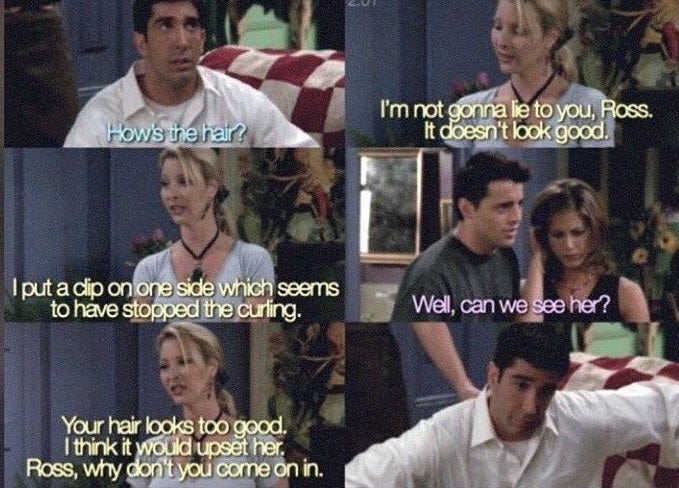Comedy is rooted in tragedy.
That’s the most surprising thing I learned in CEGEP—a pre-university college I attended thirteen years ago. Ever since, it’s been a lens through which I view comedy.
“Tragedies are first heard of, as stage plays […] in Athens at the turn of the fifth-century b.c.e., and comedies appear as a contrasting type of play a century later.”
Fast forward to the present, and the most revered sitcoms have captured audiences by converting tragic scenarios—such as failure, humiliation, and degradation—into comedy.
The Fresh Prince of Bel-Air example
Ever watched The Fresh Prince of Bel-Air? If you have, you’re well aware that Uncle Phil’s weight is a regular punch line for main character Will Smith.

The show doesn’t portray Uncle Phil’s feelings about the criticism beyond surface-level eye rolls, but it’s safe to say there’s underlying pain. This is a classic example of using degradation as a source of comedy.
FRIENDS example
FRIENDS also has staple punch lines centred around the characters’ pain points—whether it’s Ross’s divorce pattern, Phoebe’s former street life, Monica’s former weight problems, Gunther’s invisibility to Rachel, or one of many others.
FRIENDS also does humorous parallels of tragic events. For instance, they used a hospital patient protocol to portray a scenario in which Phoebe accidentally gives Monica a hideous haircut:
Bonus points if you picked up on the dig at Ross’s hair being another degradation-turned-punch-line. Because if you’re a FRIENDS fan, you’ll know that Ross’s insecurity about his hair—and how much gel to use in it—is an ongoing pain point the audience thrives on.
Real-life examples
Sitcoms aren’t the sole beneficiaries of converting tragedy into comedy. Lots of people find humour in their everyday struggles or manage to “make light of situations.”
💂🏼♀️ London example
For instance, the British are champions of self-deprecating humour. I remember a London colleague once brought a group of us to laughter by describing his morning school run with his kids. He described it as “hell” and summed up his daughter’s uncooperative nature by saying, “she hates me—just like her mother.”
With said colleague being such a friendly and likeable guy, it was obvious he was being sarcastic. But the takeaway is the pain of handling his four-year-old daughter had become a source of comedy for him. And it became a source of comedy for our team given the second incident in the dad-versus-daughter saga ended with the dad getting scolded by the daycare teacher for the daughter’s outfit choice after she had thrown a tantrum and refused to change. As the dad put it, he had just wanted to get out of the house “in one piece.”
⚜️ Montreal example
Another memory burned into my brain was a conversation I had with a handful of mentors I’d met at a networking event in Montreal. It was eight years ago, and I was in the early stage of my career.
We were talking about the challenges of “turning off” from work and one of the ladies was laughing as she recounted how she was still sending emails from her Blackberry while she was in labour. She said it proudly and everyone commended her for being “hardcore.”
I smiled and nodded along to be polite but inside I was horrified. I realized how tragic it is that “working at all costs” is seen as a badge of honour on this side of the Atlantic, and swore I would never adopt that mentality.
🏖️ Vacation in Europe versus (North) America
I was most recently reminded that comedy is based on tragedy when I saw this tweet:
Granted this is an exaggerated take, the underlying contrast in work-life balance in Europe versus North America is spot on. Why else would it rack up 183.3K likes?
It’s funny—but sad when you think about the truth behind it.
Emotions in learning
By now you get the gist that tragedy and comedy are linked. But it’s also helpful to understand how they play into learning.
Pause for a moment to think about your most vivid memories—chances are you associate them with one or more emotions. Whether it’s something that happened to you or a story that affected you, you remember it because it triggered a feeling of happiness, sadness, surprise, fury, disgust, etc.
Why do you think I remember the link between tragedy and comedy thirteen years later? My CEGEP run lasted two years, I took twenty classes, and I heard countless facts—most of which I have no recollection of—yet I remember the exact moment I found out comedy was based on tragedy. I can see the classroom, the teacher, and everything about that day in my mind. The information was a big surprise to me—hell, it’s pretty counterintuitive—so it was encoded in my long-term memory.
That said, you’re guaranteed to help your students encode your teachings into long-term memory if you evoke their emotions.
😎 CHALLENGE: Next time you introduce a concept, consider how you can “hook” your audience with an emotion-evoking piece of information (ex. personal story, case study, historical example, counter-intuitive revelation—you name it).
That’s a wrap for today. Thanks for being one of my first 215 subscribers.
For those of you new to this burgeoning community of course creators and writers, you can check out past editions here. Also, feel free to hit reply with feedback. I would love to hear from you.
Have a wonder-full week,






Really enjoyed this article Alexandra 👏👏
I learnt something and you have me thinking how true this is!
Thx for a great read 👍